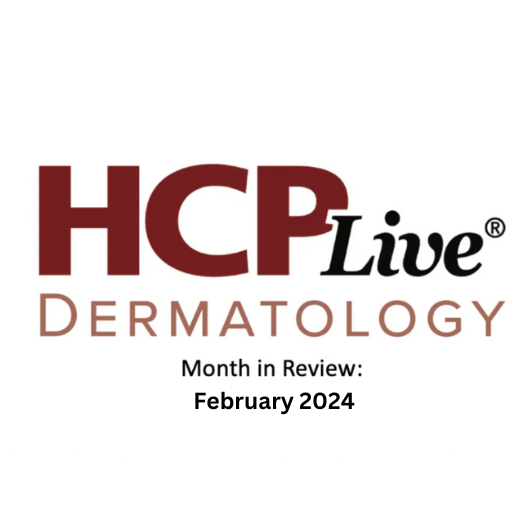News
Article
Dermatology Month in Review: February 2024
Author(s):
In the February edition of Dermatology Month in Review, new acne guidelines released by AAD, an FDA decision on nemolizumab, and an interview on potentially the first oral IL-23 inhibitor for psoriasis were among the major stories.

During the month of February 2024, the dermatology field saw a number of important events such as a US Food and Drug Administration (FDA) decision on nemolizumab for prurigo nodularis, new guidelines on acne vulgaris released by the American Academy of Dermatology (AAD), and several findings presented at the American Academy of Allergy, Asthma & Immunology (AAAAI) Annual Meeting.
The field is evolving rapidly, with coverage on several of these topics hinting at advancements on the horizon, highlighting the ongoing pursuit of different therapies to address the needs of patients. Each of these stories addressed a unique development in the field in the month of February.
American Academy of Dermatology Reveals New Acne Vulgaris Guidelines
https://www.hcplive.com/view/american-academy-of-dermatology-reveals-new-acne-vulgaris-guidelines
In early February, the American Academy of Dermatology (AAD) announced the addition of 18 evidence-based recommendations and 5 practice statements to their guidelines for dermatologists treating acne vulgaris.
Some recommendations included the recommended use of different topicals, oral isotretinoin for severe acne, and the combining of topicals with different mechanisms of action. The analysis leading to these guidelines was led by John S. Barbieri, MD, MBA, who highlighted acne's prevalence among Americans and impact on around 85% of adolescents.
Female Patients with Psoriasis, Related Clinical Characteristics More Likely to Develop Psoriatic Arthritis
A study conducted to evaluate predictive factors of psoriatic arthritis (PsA) concluded that female patients with severe psoriasis, nail involvement, and a requirement for oral systemic therapy were shown to be at greater risk of PsA. The retrospective cohort study assessed the distinct clinical characteristics of those with psoriasis and was led by Wai Yang Loo, MD, from the department of medicine at Universiti Malaya.
“The findings of this study suggested that patients with psoriasis who are female, have nail involvement, severe skin psoriasis, and use of systemic therapies for psoriasis are at greater risk of developing PsA,” Loo and colleagues explained. “Patients may benefit from increased screening, which can lead to earlier diagnosis and treatment.”
Biologics License Application for Nemolizumab Accepted by FDA for Prurigo Nodularis, Atopic Dermatitis
The US Food and Drug Administration (FDA) and the European Medicines Agency made the decision to accept the Biologics License Applications and Marketing Authorization Applications of nemolizumab for prurigo nodularis and for atopic dermatitis. Nemolizumab is a first-in-class investigational monoclonal antibody which is designed to address itch patients through the inhibition of IL-31 signaling.
Officials with the FDA also granted nemolizumab Priority Review for its implementation in treating those with prurigo nodularis. These announcements were the direct result of the drug’s success in the phase 3 OLYMPIA and ARCADIA studies.
Robert Bissonnette, MD: Discussing the First Oral IL-23 Inhibitor for Psoriasis
Robert Bissonnette, MD, the Chief Executive Officer and medical director of Innovaderm Research, discussed his team’s recent findings with the HCPLive team on the investigational, oral peptide inhibitor JNJ-2113 and its use among psoriasis patients. JNJ-2113 was noted as the first and only investigational targeted oral peptide inhibitor which specifically blocked IL-23 receptors and inhibited pathogenic T-cell activation in this patient population.
“In terms of what's unique about this study, it is that, for the first time, we were able to show that administering a small peptide, orally, that was selected for 1 cytokine receptor, we could improve an immune mediated disease…but the same concept could be envisioned for other immune mediated inflammatory diseases,” Bissonnette said.
PH Labeling of Liquid Synthetic Detergents May Improve Outcomes for Atopic Dermatitis
New findings presented at the 2024 AAAAI Annual Meeting, synthetic skin cleansers were shown to have been more likely to be acidic than other cleansers, yet pH labeling on such products is generally scarce. The study’s primary author was Adil Khan, MD.
"Shopping for skin cleanser products for atopic dermatitis can be dizzying with so many options available and different claims made on the labels," Khan explained. "Manufacturers that choose to disclose a products' pH on the label can help narrow the choices. In particular, liquid synthetic cleansers most closely mimic normal skin pH."
Most Effective Atopic Dermatitis Treatments May Pose Greatest Risk of Adverse Events
In these findings presented at the 2024 AAAAI Annual Meeting, the investigators reported that drugs such as high-dose upadacitinib may be highly-effective among atopic dermatitis patients, yet many of these same treatments may pose a greater risk for adverse events. In other words, some of the most effective therapies for eczema may also be the riskiest.
The research team led by author Alexandro Chu, BHSc, systematically reviewed and meta-analyzed the benefits and drawbacks of the options for atopic dermatitis patients. They worked on appraising the evidence through various methods, looking at exacerbations, severity, disturbances of patients’ sleep, life quality, severity of itch, and adverse events.




